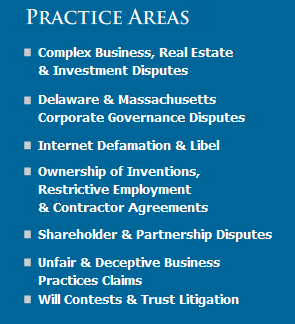Boston, MA Arbitration Litigation Attorney
Court or Arbitration
The advantages of arbitration include a quicker, less formal and less expensive resolution of a business dispute. However unlike judges, arbitrators are not strictly bound to follow the law. So a business defendant facing a sympathetic plaintiff with substantial damages but having a contractual legal defense, such as for example a release of liability, may prefer to avoid arbitration.So depending on the circumstances a company may seek to compel or avoid arbitration.
The mere existence of an arbitration clause in a contract does not assure that all disputes between the parties to that contract must be arbitrated.
As a general matter, arbitration agreements are construed broadly in favor of arbitration. Moses H. Cone Mem. Hospital v. Mercury Construction Corp., 460 US. 1 (1983). At the same time arbitration is a matter of contract and “a party cannot be required to submit to arbitration any dispute which he has not agreed so to submit.” AT&T Technologies, Inc. v. Communications Workers of America, 475 U.S. 643,648 (1986).
Sometimes a party who has not signed an arbitration agreement may be compelled to arbitrate. For example under traditional state law principles a commitment to arbitrate may be incorporated by reference into another agreement, and may be assumed, sometimes even by waiver or other inequitable conduct. Arthur Andersen LLP v. Carlisle, 556 U.S. 624, 631 (2009).
While disputes about performance of the parties’ contract featuring an arbitration clause are typically arbitrable, sometimes a tort claim is not. For example in Mitsubishi Motors Corp. v. Soler Chrysler-Plymouth, Inc., 473 U.S. 614 (1985) the arbitration clause featured dragnet language requiring arbitration for “all disputes arising out of or relating to” but limited this broad reach to specified portions of the parties’ contractual relationship. It is not sufficient to compel arbitration to find that the agreement covers a particular type dispute; unless the factual underpinnings of a claim implicate, touch on or are closely related to the contract provision requiring arbitration, the particular claim is not arbitrable.
Arlo Guthrie had a contract with a concert promoter. The agreement required arbitration of any dispute involving the folk singer’s musical services provided the dispute arose out of or was connected with the contract. During the concert Guthrie allegedly slandered the promoter. Because proof of the defamation claim was wholly independent of proof of performance of the contract, the promoter’s breach of contract was arbitrable but his slander claim had to be tried in court. Fuller v. Guthrie, 565 F. 2d 259 (2d Cir. 1977). Because the two “protagonists have agreed to arbitrate [at least] some claims [,]" there must be two separate litigations. See McCarthy v. Azure, 22 F.3d 351, 354-55 (1st Cir. 1994).
Enforcing Or Vacating Arbitrable Awards
The general rule is that an arbitrator’s decision is the last word on the parties’ dispute. Under both the Federal and Massachusetts Arbitration Acts, upon motion of the prevailing party, an arbitral award is to be summarily entered as a judgment in a court of law. After all a principal purpose of arbitration is to avoid having to go to a Court for a final and binding resolution. Therefore under both the Federal Arbitration Act and the Uniform Arbitration Act, even if an arbitrator mistakenly applies the law or erroneously finds facts, the arbitral award will be upheld subject only to specific statutorily prescribed exceptions for fraud, specified misconduct or if the arbitrators exceeded their authority.The United States Supreme Court recently held that the Federal Arbitration Act’s sections 10 and 11 are the sole bases on which a federal court may vacate or modify an arbitral award. Hall Street Associates LLC v. Mattel, Inc., 552 U.S. 576 (2008). To vacate, modify or amend an arbitral award, a disappointed party must frame his search for a needle in a haystack within one of two statutory bases for vacating or modifying an award, described generally as:
- egregious departures from the parties’ agreed-upon arbitration: “corruption,” “fraud,” “evident partiality,” “misconduct,” “misbehavior,” “exceed[ing] ... powers,” “evident material miscalculation,” “evident material mistake,” “award[s] upon a matter not submitted;” the only ground with any softer focus is “imperfect[ions],” and a court may correct those only if they go to “[a] matter of form not affecting the merits.”
In the Mattel case, the parties had provided in their arbitration contract that the decision of the arbitrator was to be vacated, modified or corrected by the court if the arbitrator’s conclusions of law were wrong. But the Supreme Court held that at least in cases implicating interstate commerce, such contract provisions are not enforceable.
In Katz, Nannis & Solomon, P.C. v. Levine, 473 Mass. 784 (2016) the Massachusetts Supreme Judicial Court adopted the same principles under the Massachusetts Arbitration Act, which features substantively similar bases for vacating, modifying or correcting an arbitral award. See Massachusetts General Laws Chapter 251. While the United States Supreme Court had “made clear that States are free to reach a different result on grounds of State statutory law or common law,” the SJC held “the corresponding provisions” of the Massachusetts Arbitration Act “limit the scope of judicial review” to the narrow precisely crafted sections 12 and 13 of the Massachusetts Arbitration Act.
We note that seeking to delay entry of judgment by raising bad faith claims to vacate or modify an arbitral award can constitute a separate actionable unfair and deceptive business practices claim pursuant to which the arbitral victor might sue for multiple damages and attorney’s fees.

